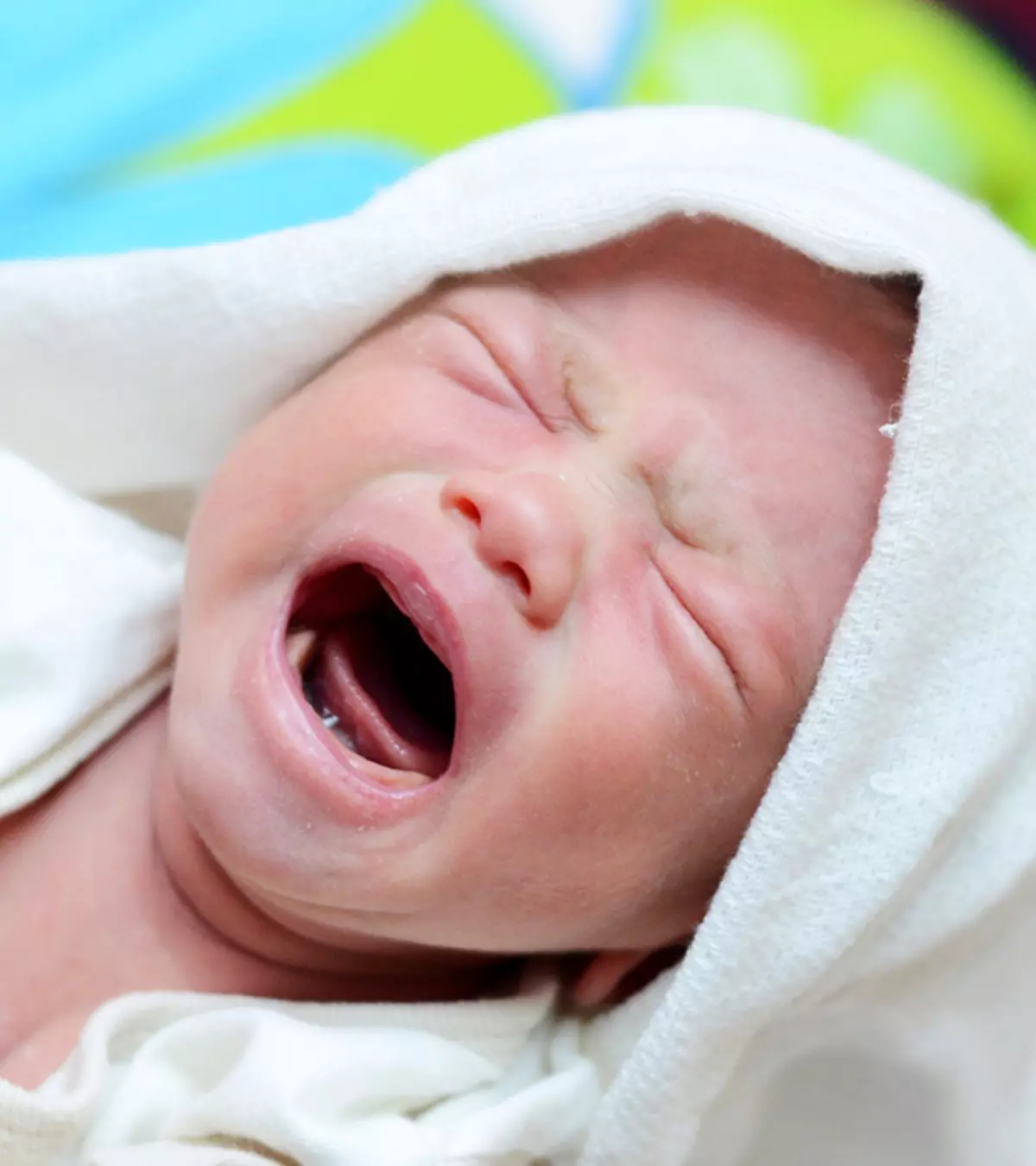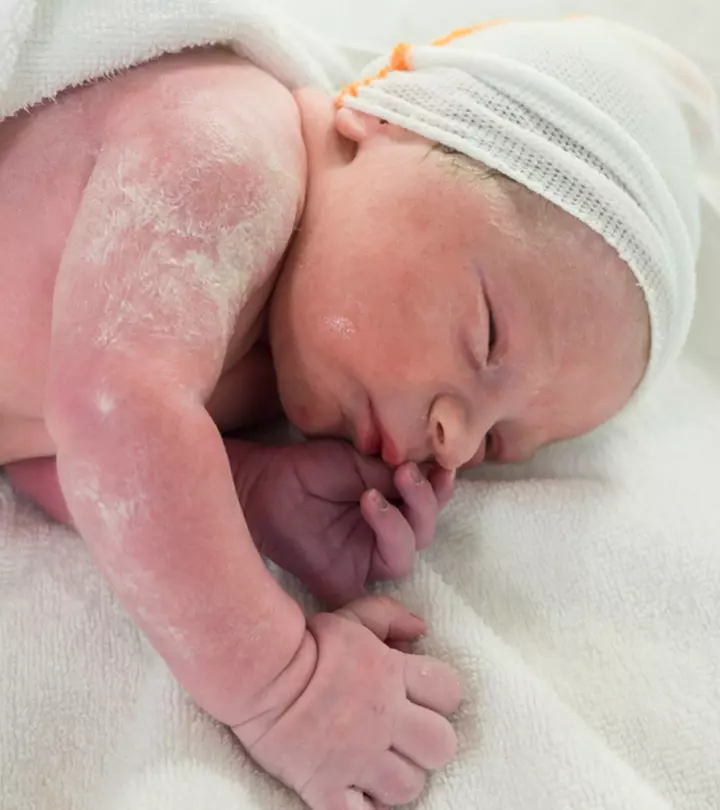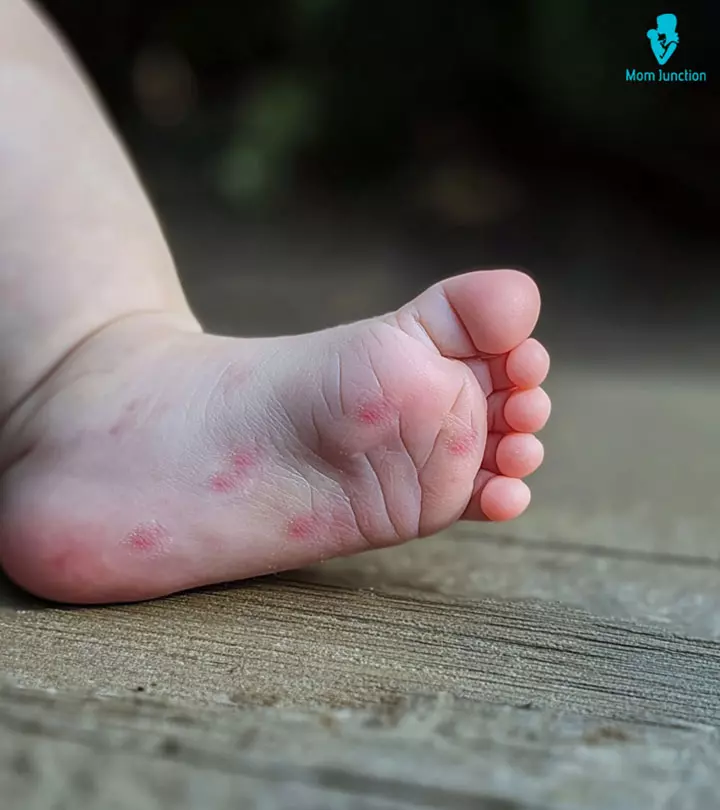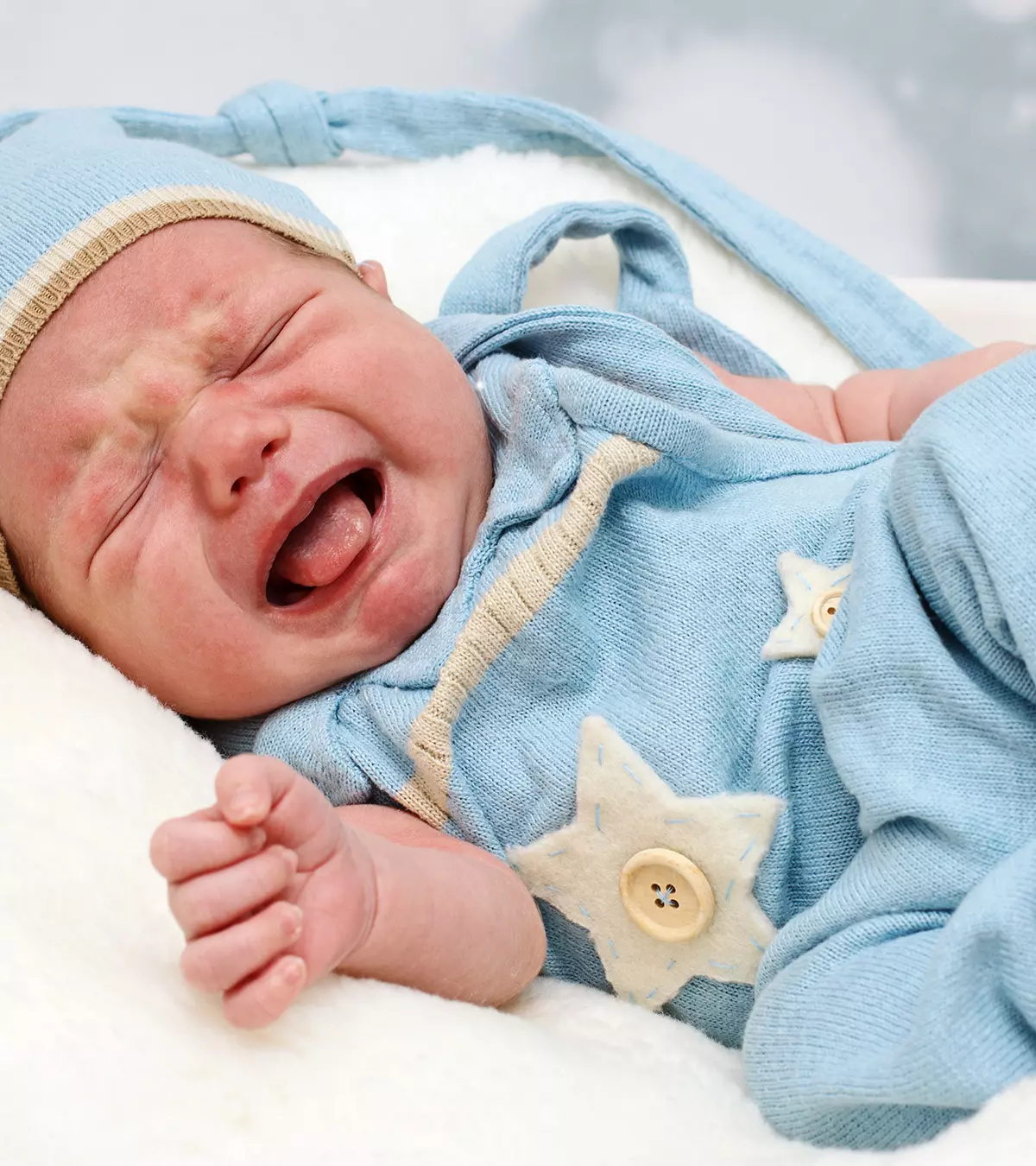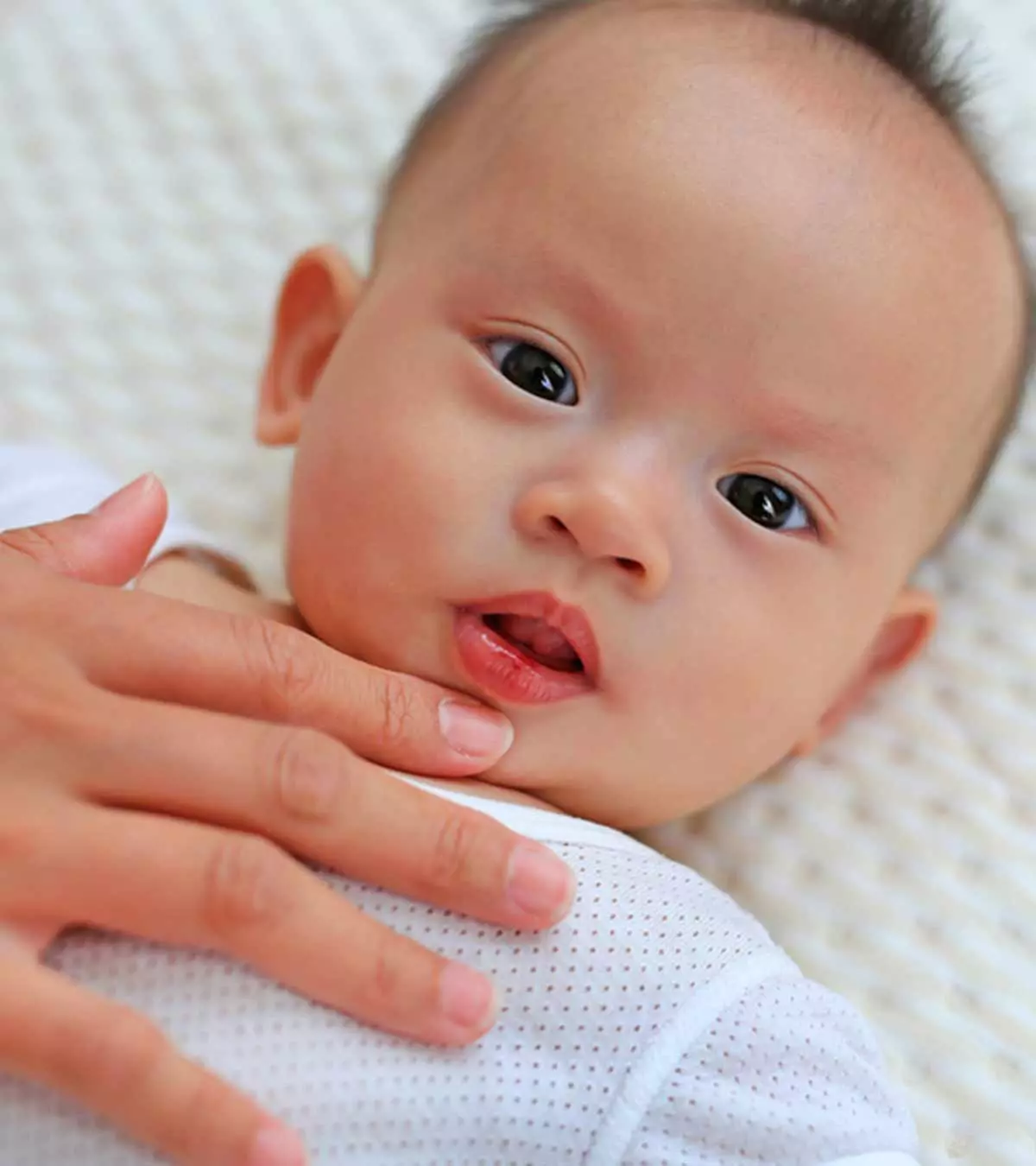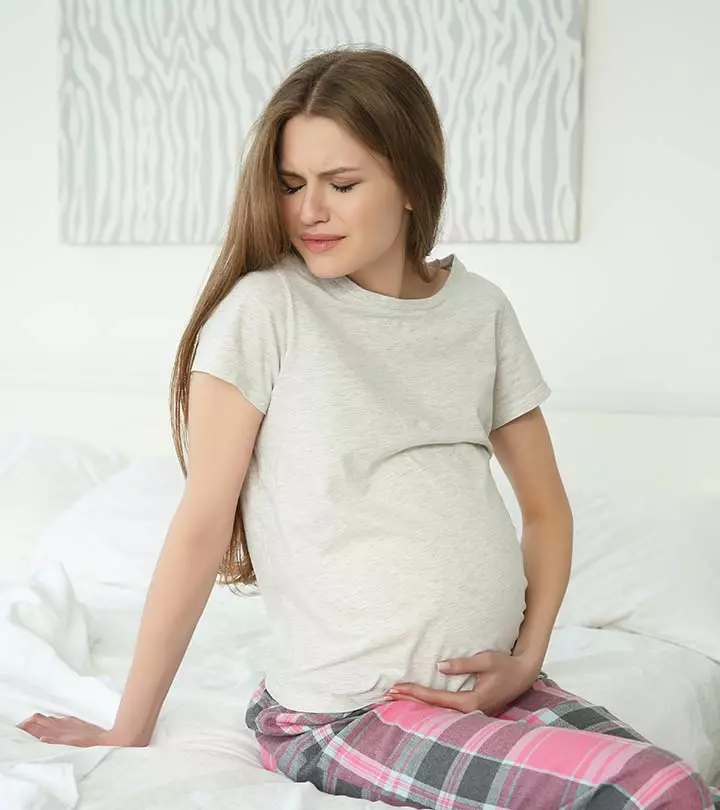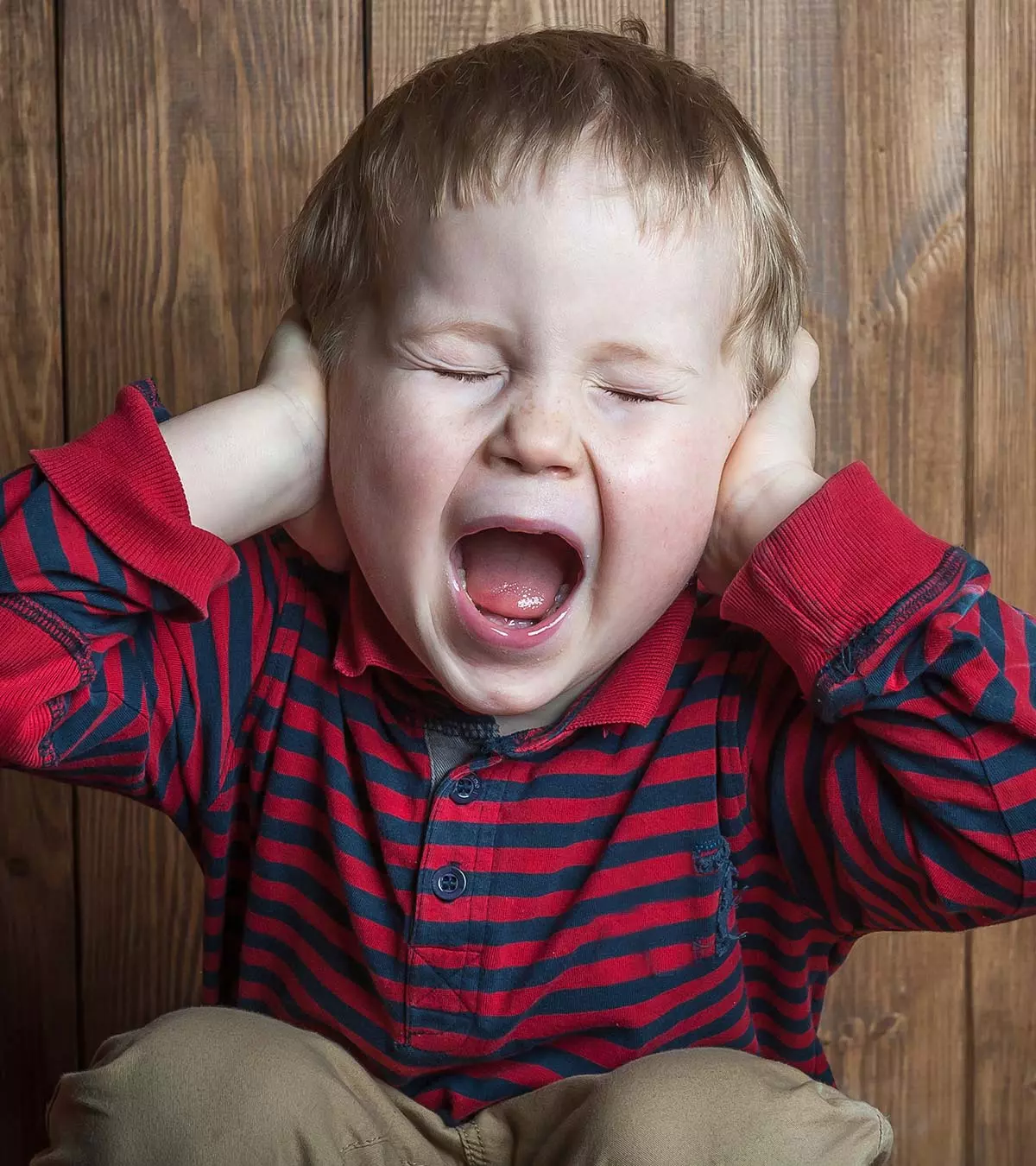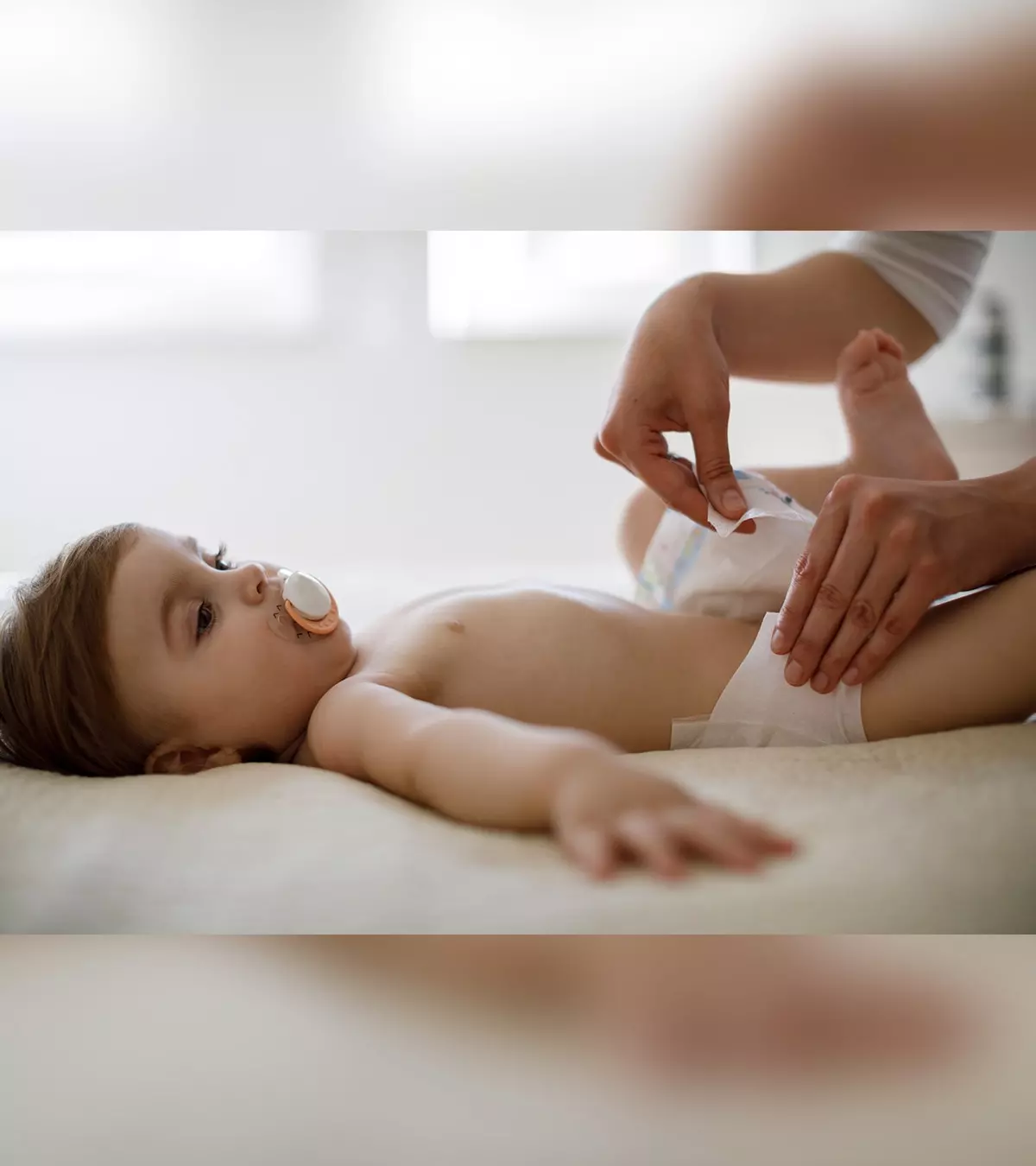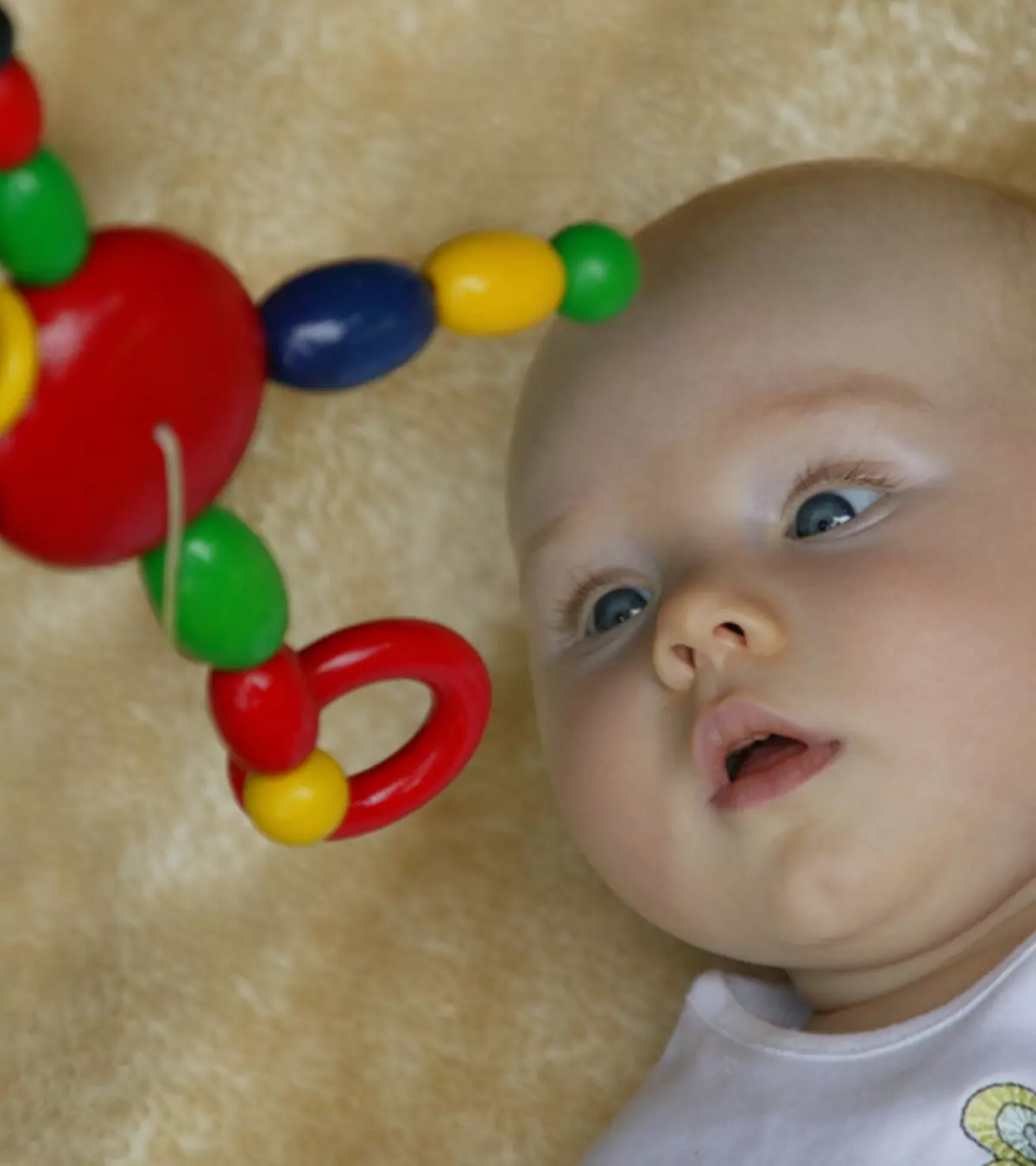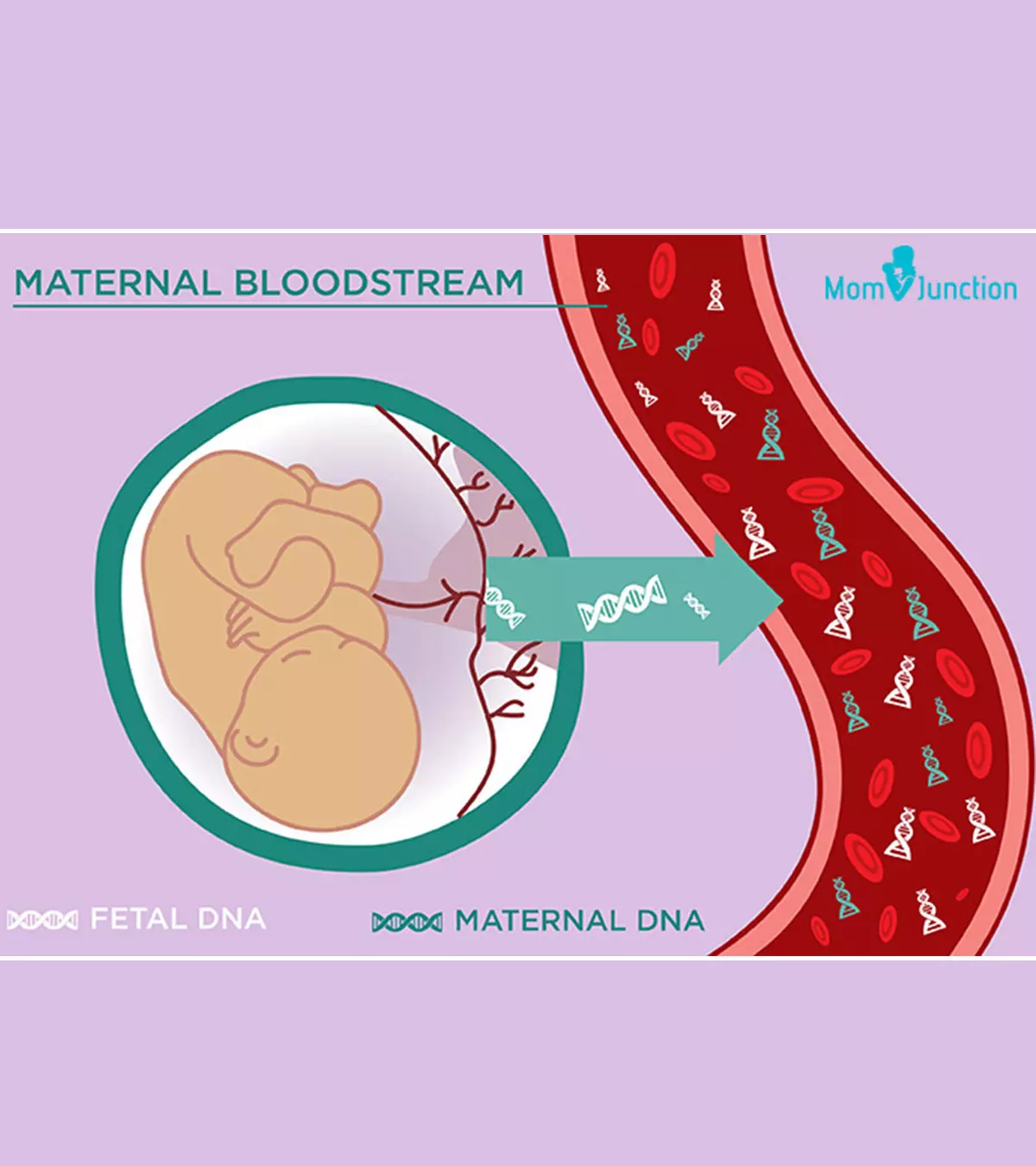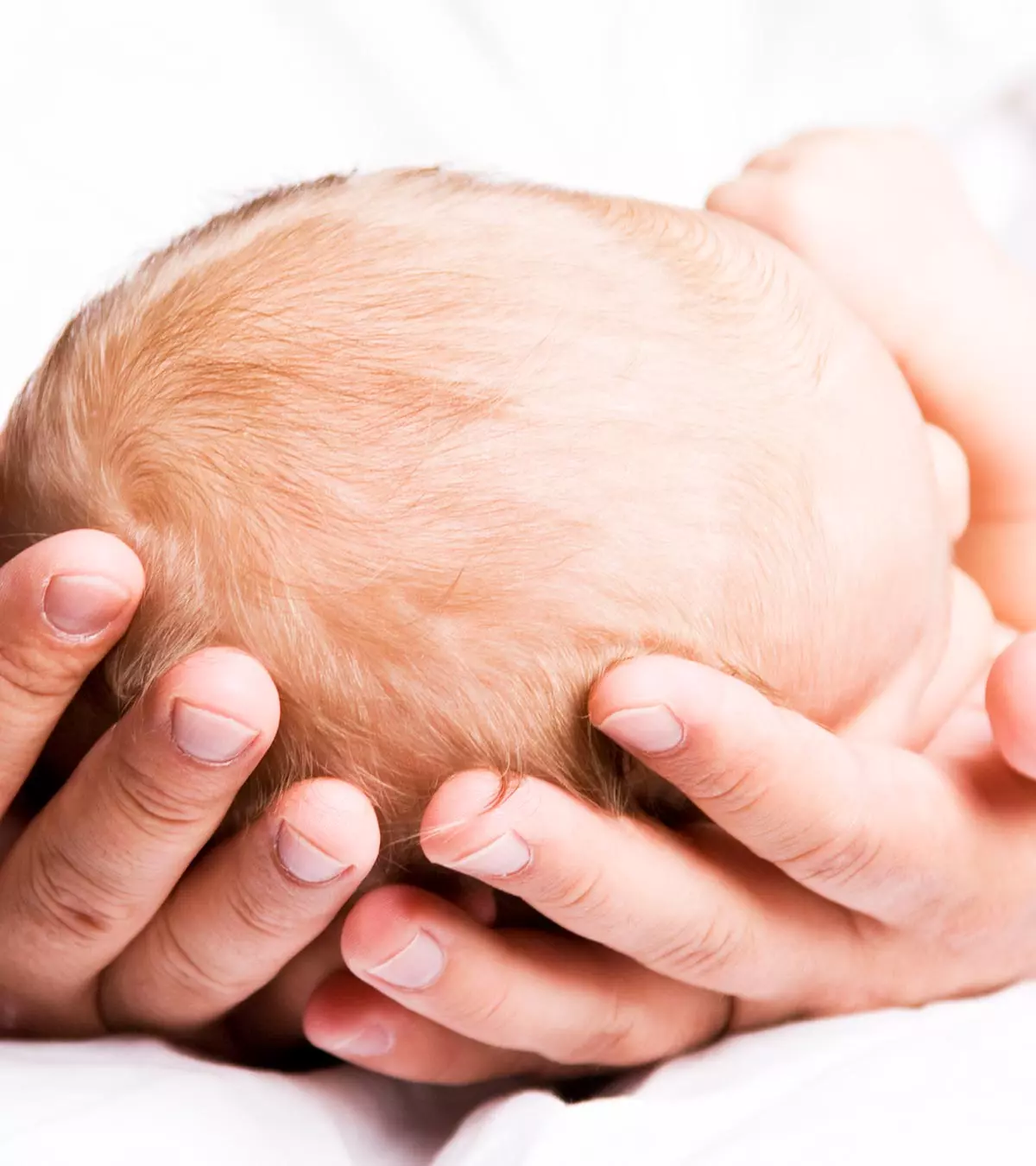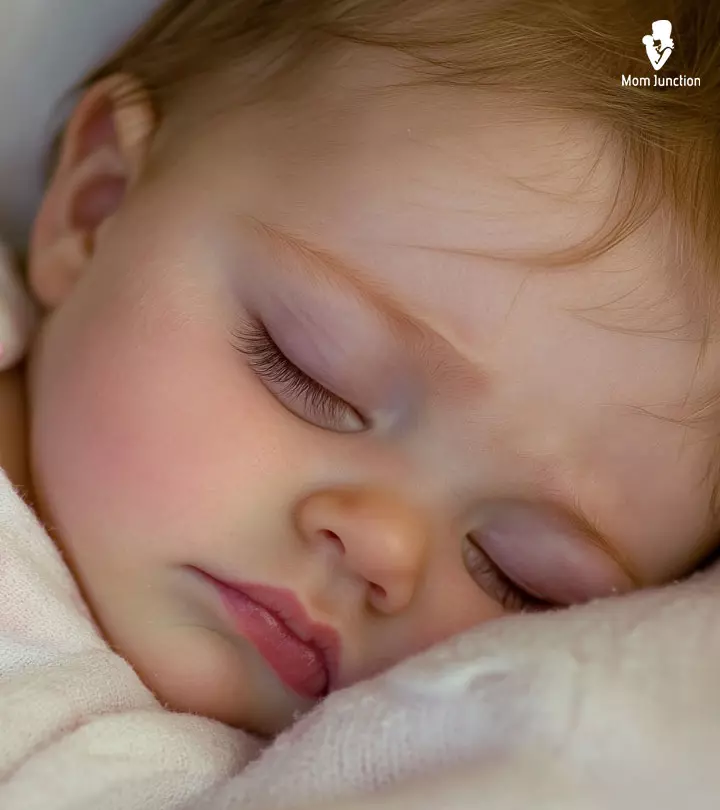
Image: Midjourney/ MomJunction Design Team
Swollen baby eyes can leave parents worried since eyes are delicate and essential organs. The swelling of the eyes can be of different intensities, depending on the underlying reasons, including infections and injuries. Sustained swelling may increase the risk of vision and other eye-related problems. Prompt identification and treatment can help improve outcomes and prevent complications. Read this post to know about the various reasons, home remedies, and treatment options for swollen eyes in babies.

Key Pointers
- Depending on the severity, swollen eyes in babies can be mild, moderate, or severe.
- Swelling in one eye may be caused by insect bites or allergies, while swelling in both the eyes may be due to conjunctivitis or edema.
- Treatment of swollen eyes may include antibacterial eye drops, topical antibiotics, surgical corrections, and more.
- Mild or moderate swelling can be treated with home remedies such as ice packs or warm compresses.
- Consult a doctor if the baby has severe symptoms, including fever with swelling, pus oozing from the eye, or pain in the eyelids.
Severity Of Baby’s Swollen Eyes
The swelling in a baby’s eyes includes swelling in the tissues of the eyelids, eyeballs, and the orbits where the eyeballs are located. The severity of eye swelling in babies can be determined through the following scale (1).
- Mild swelling: The swelling is considered mild when the puffiness is limited to the eyelids, but they open normally.
- Moderate swelling: The eyes are more than puffy, but the eyes are still opening normally.
- Severe swelling: The swollen lids cause the eyes to shut or remain almost shut. There may also be swelling in the eyeball tissues, such as the conjunctiva and scleraiThe white coating on the outer surface of the eyes that extended to the corners. (white of the eye).
Infographic: Interpreting Causes And Tips To Prevent Eye Swelling In Babies
Some thing wrong with infographic shortcode. please verify shortcode syntaxWhat Causes Swelling In Baby’s Eyes?
There are several reasons for eye swelling, depending on whether one or both the eyes are affected (2).
Causes of swelling in one eye
- Rubbing the eye: It is common for babies to touch or rub their eyes with dirty hands. Baby rubbing eyes can cause dust and other irritants on the hands, such as food particles, to enter the eyes and irritate them, causing them to swell temporarily and become irritated.

- Insect bites: Insect bite on the periorbitaiThe area that consists of the layer and tissues and surrounds the orbit. (region around the orbit or eye socket) or on the eyelid may lead to swollen baby eyes. Mosquito and ant bites are some common reasons.
- Allergies and contact dermatitis: Babies susceptible to allergies or related conditions, such as contact dermatitis (eczemai), may develop swollen and itchy eyes on contact with an allergen. Some common triggers are plants, insects, pollen, dust, and pet dander.
- Sty: Sty in babies could occur due to infection or blockage of oil gland ducts of the eyelid or the follicles of the eyelashes. The condition can cause a prominent boil on the affected eyelid. ChalazioniPainful and irritating red bump on the eyelid. , which only affects the oil gland ducts, could also lead to the same results.
 Point to consider
Point to consider- Dacryocystitis: It is the infection of the lacrimal saciA hollow structure near the inner corner of the eye, responsible for draining tears from the tear-producing glands into the nose. or the tear sac, which lies in the inner corner of the eye towards the nose. Bacteria are the most common cause of this infection.
- Blocked tear ducts: According to the American Academy of Ophthalmology, blocked ducts are prevalent among 20% of babies born in the US (4). The tear duct or the nasolacrimal duct drains the tears from the eyes to the nasal cavity. A blocked tear duct in babies could lead to crusty and swollen eyes. There are several reasons behind blocked tear ducts, including congenital anomaliesiStructural or functional abnormalities that happen inside the womb and are present at birth. of the tear duct (5).
- Sinus infections: Sinuses lie between the nasal cavity and the eyes. Any infection in the sinuses may result in swelling around the eyes.
- Periorbital cellulitis: It is the infection of the tissue of the periorbita, the region around the eye socket. Bacteria are the most common causes of the infection (6).
- Blepharitis: Blepharitis is an eyelid condition caused by a bacterial infection or abnormal production and secretion of the sebaceous glands. Inflammation of these oil-producing glands leads to eyelid swelling and crusting around the eyelashes. Although treatable, blepharitis may recur even after many years (7).
- Injuries: Eye injuries caused by direct contact with soap, dirt in the eyes, or being hurt in the eye can cause redness and swelling of the eyelid. A recent injury around the eye area, even if not directly to the eyes, can also cause a swollen eyelid (8).
Causes of swelling in both eyes
- Conjunctivitis: Conjunctivitis, commonly known as pink eye, is the inflammation of the conjunctiva, the thin membrane that lines the inside of the eyelids and covers the sclera (the white part of the eye). Research shows that infectious neonatal conjunctivitis affects about 1% to 2% of newborns (9). Pink eye in babies can be caused by bacterial or viral infections, or it can result from an allergy, leading to redness and swelling of the conjunctiva (10).
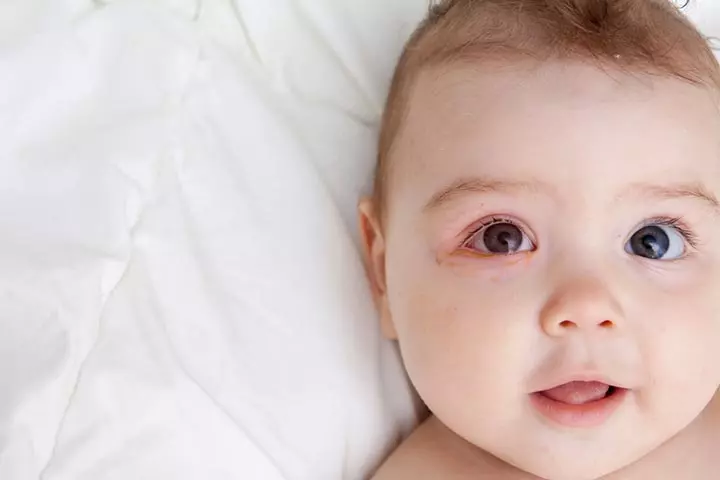
- Edema around the eyes: EdemaiSwelling of the body parts due to excess fluid accumulation in bodily tissues. is the retention of fluid within body tissues, causing localized swelling. Periorbital edema could occur due to fluid accumulation around the eyes. It may result from serious underlying issues, such as kidney, liver, or heart problems. Nephrotic syndrome is a condition that causes too much protein to enter the kidneys, causing edema and swelling around the baby’s eye, especially after they wake from sleep (11).
- Anaphylaxis: It is a life-threatening allergic reaction, causing swollen body tissues, including eyes and eyelids. It is often accompanied by breathing or swallowing difficulty and skin hives. Certain food items, drugs, and the sting of some insects, such as bees, are common triggers (12).
 Be watchful
Be watchfulIn babies, eyelid swelling can also be caused by conditions such as corneal ulcers, which may result from infections or trauma, endophthalmitis, a severe intraocular infection, retinoblastoma, a rare eye cancer that may present with swelling, lid abscesses, resulting from bacterial infections, herpes zoster ophthalmicus, a viral infection affecting the eye area, and erysipelas, a bacterial skin infection (14) (15).
Besides these causes, other eye injuries could also lead to swollen eyes in babies (16). If you notice swelling in one or both of the baby’s eyes after an injury, take your baby to a doctor immediately. If the injury is due to a chemical or substance entering the baby’s eyes, carry the container of the compound so that the healthcare providers may administer the relevant antidote or remedy.
How Are Swollen Eyes In Babies Treated?
The treatment of swollen eyes depends on the cause and intensity of swelling. Mild and moderate swelling may not require any treatment. Severe swelling and some cases of swollen eyes may require the following treatment modalities.
- Antibacterial eye drops may be advised in case of bacterial conjunctivitis (17).

- Allergy-related swelling and conjunctivitis in the eye may require antihistamine drops and oral medication (18).
- Topical antibiotics may be prescribed for external eyelid swelling, such as due to a sty (19).
- Surgical correction of anomalies, such as tear duct blockage, may be needed in some cases (20).
- Serious infections, such as periorbital cellulitis, may require hospital admission and administration of intravenous antibiotics (21).
- Relevant treatment for other causes, such as nephrotic syndrome, may be needed to cure swollen eyes in some cases.
Home Remedies For Swollen Eyes In Babies
You may consider the following home remedies for mild to moderate eye swelling in babies (2).
- If swollen eyes are due to an insect bite, it is usually harmless and resolves by itself. If the baby seems uncomfortable, you may apply an ice pack or ice wrapped in a wet cloth to the affected eye for five minutes at a time for 20 minutes and alleviate any burning sensation (1).
- If your baby’s eye swelling is due to a sty, apply a warm compress for five minutes, three to five times a day (19). Use a clean washcloth each time.
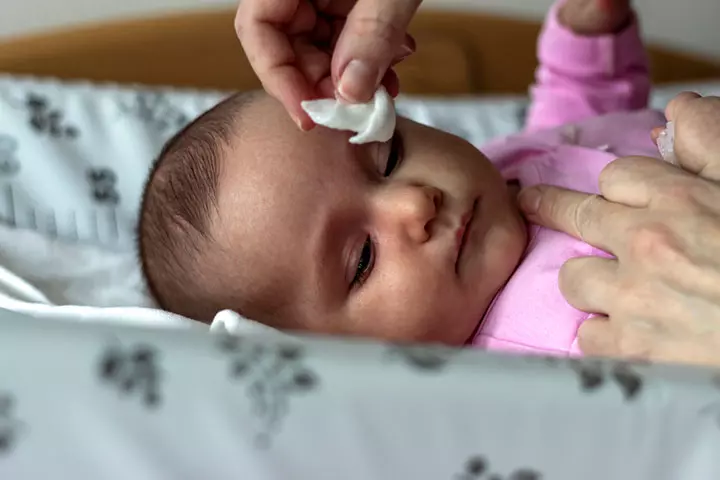
- If your baby’s eye swelling is due to contact dermatitis or allergy, avoiding the substance is the best way to relieve the swelling and prevent it from recurring (21).
- If your baby’s eyes get swollen due to an infection, contact a pediatrician for a proper diagnosis and treatment. At home, you may take precautions such as washing hands before touching the baby, cleaning the baby’s towels and bedding weekly, and disinfecting floors, cribs, toys, and other items to prevent infections (22).
- If a baby has a swollen eye due to a foreign object or irritant, such as dirt or an insect, using a sterile saline rinse can help remove it. However, consult a pediatrician beforehand to learn the correct dosage and administration method. Only use saline specifically designed for eye use from a pharmacy or the type recommended by a doctor, as homemade saline could cause eye infections (23).
Home remedies, such as applying a cold compress, may help reduce swelling if a baby has periorbital edema. A study report states, “It was found that most people found using cold compression, getting enough sleep, and applying cucumbers to be effective in dealing with eye puffiness (24).” However, scientific studies on the effectiveness of these remedies in infants are limited. Therefore, it is best to follow a pediatrician’s advice rather than relying on home treatments.
 Quick tip
Quick tipWhen To See A Doctor?
The swollen eyelids’ severity and associated symptoms should guide you to decide if you must call your doctor.
You must call your pediatrician and seek immediate care in the following cases (2).
- Severe swelling in one or both eyes
- Eye swelling is accompanied by a fever

- Eyelids or sclera appear red, swollen, and puffy
- Pus or watery liquid oozes from the eye
- Baby shows behavioral changes or appears unwell
You may contact a pediatrician within 24 hours in the following cases.
- Baby has one or two swollen eyelids with no fever and no effect on the baby’s routine
- Sore or tender eyelids with no other symptoms
- Periorbital swelling (swelling around the eyes) but no other symptoms
- Redness and mild swelling of the sclera but no fever
- Cloudy vision
Frequently Asked Questions
1. Is it okay to put breastmilk in the baby’s eye?
Some research suggests breastmilk is as effective as other ophthalmic solutions for managing eye discharge. You should consult your baby’s pediatrician before putting breast milk in your baby’s eyes (25).
2. Can a baby’s eye infection go away on its own?
Eye infections in babies always need medical attention. In most cases, the doctor may prescribe antibiotic eye drops or ointments (26).
3. How long does it take for swollen eyes in babies to go away?
Swelling in a baby’s eyes may take anywhere from one to three days to go away, depending on the cause. However, it is recommended to consult a doctor if other symptoms appear after the initial 24 hours or if the condition persists beyond the three-day period with no other symptoms (2).
4. Can food allergies cause eye swelling in babies?
Food allergies or sensitivities might lead to eye swelling or swelling of the eyelids as part of a broader allergic reaction (27). If a baby consistently has eye swelling after eating certain foods, it may indicate an allergy. Remember, any sudden or severe eye swelling should be evaluated by a healthcare provider promptly.
Swollen baby eyes are often caused by allergies, insect bites, sty, rubbing of eyes, or blocked tear ducts. Usually, allergies and conjunctivitis cause swelling in both eyes, and other conditions can be limited to one eye. The severity of swelling may vary from mild to severe, that is, from puffiness of eyes to closed eyes due to eyelid swelling. Although it can be worrisome for parents, most babies get better with simple home care measures. Eye drops and ointments are prescribed for most babies with swollen eyes, and if there is an anatomical abnormality, surgical correction is recommended.
References
- Eyelid Swelling.
https://www.childrenscolorado.org/conditions-and-advice/conditions-and-symptoms/symptoms/eye-swelling/ - Eyelid Swelling.
https://www.seattlechildrens.org/conditions/a-z/eyelid-swelling/ - Stye and chalazion.
https://raisingchildren.net.au/guides/a-z-health-reference/stye#:~:text=A%20stye%20is%20a%20small,Styes%20are%20infectious. - Childhood Eye Diseases and Conditions.
https://www.aao.org/eye-health/tips-prevention/common-childhood-diseases-conditions#:~:text=Twenty%20percent%20of%20babies%20(2%20out%20of%2010)%20are%20born%20with%20a%20blocked%20tear%20duct. - Blocked Tear Ducts.
https://www.mottchildren.org/health-library/hw3084 - Cellulitis of the Eye in Children.
https://www.urmc.rochester.edu/encyclopedia/content?contenttypeid=90&contentid=p02074 - Blepharitis in Children.
https://www.urmc.rochester.edu/encyclopedia/content?contenttypeid=90&contentid=P02072 - Eye Injury.
https://www.seattlechildrens.org/conditions/a-z/eye-injury/ - Neonatal Conjunctivitis.
https://www.ncbi.nlm.nih.gov/books/NBK441840/ - Conjunctivitis: What Is Pink Eye?
https://www.aao.org/eye-health/diseases/pink-eye-conjunctivitis - Childhood Nephrotic Syndrome.
https://www.kidney.org/kidney-topics/childhood-nephrotic-syndrome - Anaphylaxis.
https://ufhealth.org/conditions-and-treatments/anaphylaxis - Eye Swelling.
https://www.healthychildren.org/English/tips-tools/symptom-checker/Pages/symptomviewer.aspx?symptom=Eye+Swelling - Swelling Around Eye.
https://www.aao.org/eye-health/symptoms/swelling-around-eye - Approach to Generalized Eyelid Edema.
https://eyewiki.org/Approach_to_Generalized_Eyelid_Edema - What Is a Black Eye?
https://www.aao.org/eye-health/diseases/black-eye - Conjunctivitis in Children.
https://www.stanfordchildrens.org/en/topic/default?id=conjunctivitis-in-children-90-P02078 - What Are Eye Allergies?
https://www.aao.org/eye-health/diseases/allergies - What Is the Difference Between a Stye and a Chalazion? Causes, Symptoms, Treatment.
https://www.aao.org/eye-health/diseases/what-are-chalazia-styes#treatment - Blocked Tear Duct Treatment.
https://www.aao.org/eye-health/diseases/treatment-blocked-tear-duct - Differential Diagnosis of the Swollen Red Eyelid.
https://www.aafp.org/pubs/afp/issues/2007/1215/p1815.html - A Guide to Eye Infections.
https://www.optometrists.org/childrens-vision/guide-to-pediatric-eye-conditions/a-guide-to-eye-infections/ - Saline Solution.
https://my.clevelandclinic.org/health/treatments/saline-solution - Muskan Joshi et.al; (2025); Effective Home Remedies that Provide Quick Relief for Puffy Eyes.
https://ijpsat.org/index.php/ijpsat/article/view/3479 - Tetsu Sugimura et.al; (2025); Efficacy and safety of breast milk eye drops in infants with eye discharge.
https://pubmed.ncbi.nlm.nih.gov/33098117/ - Sticky eye.
https://www.pregnancybirthbaby.org.au/sticky-eye - Food Allergy.
https://www.pennmedicine.org/for-patients-and-visitors/patient-information/conditions-treated-a-to-z/food-allergy#:~:text=Key%20symptoms%20of%20a%20food
Community Experiences
Join the conversation and become a part of our nurturing community! Share your stories, experiences, and insights to connect with fellow parents.
Read full bio of Dr. Regina A. Hardin
Read full bio of Dr. Meenakshi Maruwada
Read full bio of Rohit Garoo
Read full bio of Vidya Tadapatri







